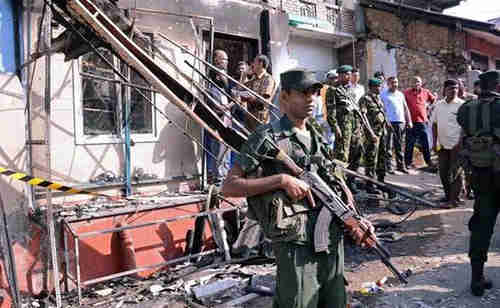Sri Lanka Declares State of Emergency After Budd
Post# of 52073
After Buddhist-Muslim Violence
< >


This morning’s key headlines from GenerationalDynamics.com
Sri Lanka declares state of emergency after Buddhist-Muslim violence
Growing violence by Sri Lankan Buddhist hardliners against Tamils
North Korea says it will denuclearize if the regime is ‘secure’
Sri Lanka’s government declared a state of emergency on Tuesday after violent clashes between ethnic Sinhalese and ethnic Tamils began to spread, eight years after the end of an extremely violent civil war between the two ethnic groups.
The sequence of events is as follows:
On February 22, a (Buddhist) Sinhalese truck driver was assaulted by four (Muslim) Tamil youths at a filling station in Digana, Kandy, in Sri Lanka. The truck driver died on Saturday.
The funeral was held in Digana on Sunday. During the funeral procession, the Sinhalese began attacking Tamil-owned shops and properties, setting some shops on fire. More than 30 shops and houses were damaged, and dozens of mosques were attacked.
Clashes between Tamils and Sinhalese erupted all over the region on Monday and in other Sri Lankan cities as well. The police imposed a curfew on Monday evening.
On Tuesday, Sri Lanka’s president Maithripala Sirisena declared a nationwide state of emergency for seven days. Under the emergency, security forces can carry out searches without a warrant and detain suspects without charges.
There has been growing tension and violence between the Sinhalese and Tamil communities, with some hardline Buddhist groups accusing Muslims of forcing people to convert to Islam and vandalizing Buddhist archaeological sites. The Buddhists have also accused the Muslims of refusing to use condoms, so they can have more babies.
It also appears that Buddhist hardliners in Sri Lanka are being influenced by the genocide by Myanmar (Burma) against Rohingya Muslims. That genocide is being led by Buddhist monks, particularly Ashin Wirathu, a Buddhist monk who turned “969” from a Buddhist sign of peace and happiness into a sign of bloody genocide and ethnic cleansing.
Buddhist monks in Sri Lanka are mimicking the genocidal incitement in Burma by using racist hate speech to target Sri Lanka Tamils – most of whom are Hindu. India Today and The Island (Sri Lanka) and UPI
Growing violence by Sri Lankan Buddhist hardliners against Tamils
It has only been eight years since the end of the civil war, but we are seeing the very early stages of something that I have described as occurring sooner or later in every country following the end of a generational crisis civil war between two ethnic groups.
Among generational crisis wars, an external war is fundamentally different than an internal civil war between two ethnic groups. In an external war, one country’s army invades another country. When the war ends, the invading army leaves and the two countries continue relations through the United Nations or international or bilateral treaties.
But when an internal civil war between two ethnic or tribal groups occurs and then ends, then the people who killed, tortured, mutilated, and raped each other still have to live with each other, often in the same villages, sometimes on the same street. And so the extreme trauma and bitterness of war continue, even though the war has ended. That is clearly what we are seeing in Sri Lanka. Furthermore, as the young babies and children who were not really aware of the war grow older, they become aware of how much they hate each other, and the violence only grows.
I have written articles about what happens to such countries as the decades pass and new generations grow up during generational Awakening and Unraveling eras. The leaders of the winning side refuse to step down and start using violence and atrocities against civilians to stay in power. These include Paul Biya in Cameroon, Pierre Nkurunziza in Burundi, Paul Kagame in Rwanda, Yoweri Museveni in Uganda, Robert Mugabe in Zimbabwe, Joseph Kabila in DRC, or, outside of Africa, Bashar al-Assad in Syria and Hun Sen in Cambodia.
This has already started in Sri Lanka. Mahinda Rajapaksa was elected president in 2005 but lost the election in 2015. He tried to get the army to overturn the election results but did not succeed in that. But we can certainly expect to see more of that in the future.
It is too early for that to be happening in Sri Lanka because the civil war ended only eight years ago. But it is pretty clear that Sri Lanka is on that path. The current violence will fizzle quickly, but as the young post-war generation grows up, the violence between Tamils and Sinhalese will grow, and the Sinhalese government will begin using violence and atrocities to control the Tamils in the name of national security. Indian Express
Related Articles
Sri Lanka has deep split with U.N. on war crimes report (23-Apr-2011)
Britain threatens Sri Lanka with war crimes investigation (17-Nov-2013)
Sri Lanka follows a predictable pattern after its civil war (15-Jan-2015)
Sri Lanka Sinhalese Buddhist monks accused of racist hate speech against Hindu Tamils (20-Nov-2016)
Report: Sri Lankan government repeatedly torturing and raping Tamils (14-Jan-2016)
Sri Lanka targets radical nationalist Buddhists in Bodu Bala Sena (BBS) (12-Jun-2017)
 (0)
(0) (0)
(0)